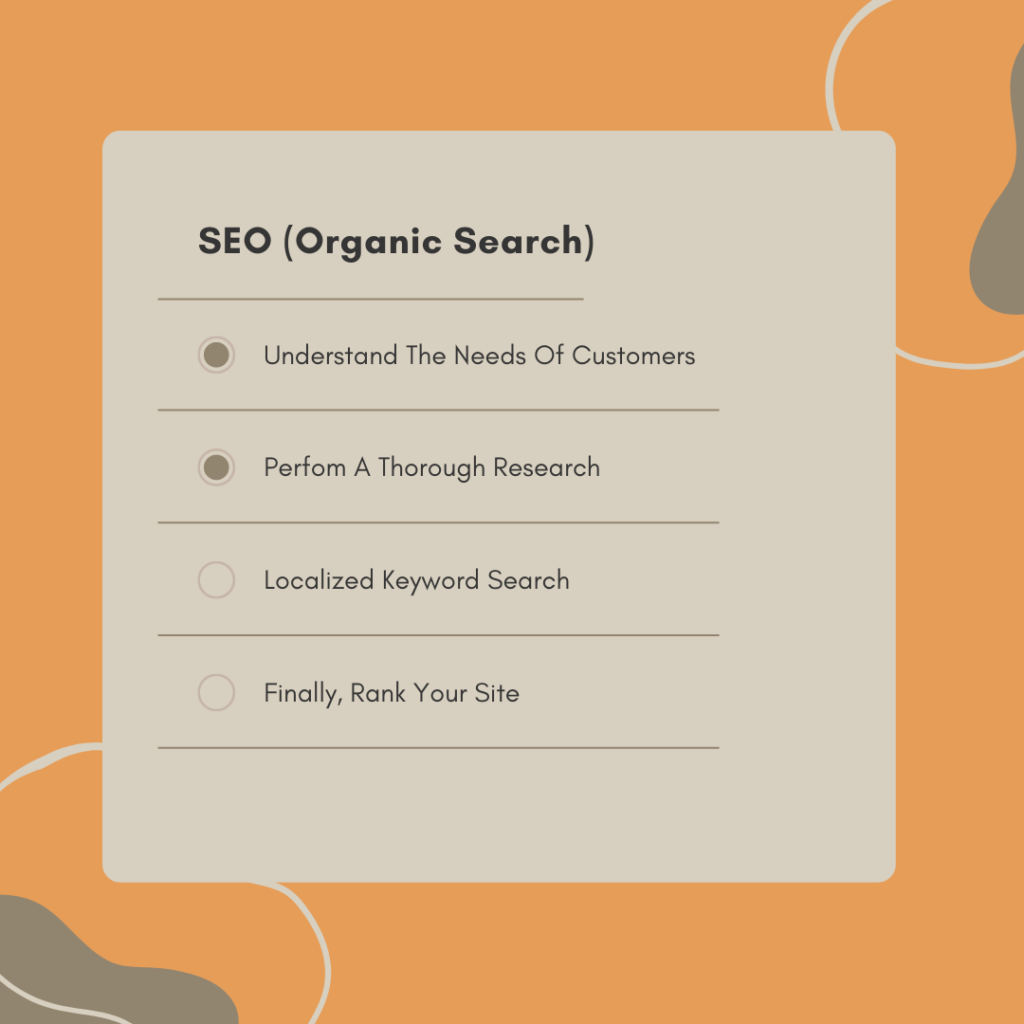If you run an online store, you know that keywords can make or break your search engine optimization (SEO) efforts. While the importance of SEO is well-known, many e-commerce owners underestimate the power of keyword research.
Keywords are more than phrases that your potential customers type into search engines — they are an integral part of any successful SEO strategy. When you properly research and select the right keywords, you can increase your search engine ranking and drive more organic traffic to your website.
The key to success is understanding how to use strategic keyword research to optimize your website for maximum visibility and sales. In this post, we’ll discuss the importance of keyword research and also we are very proud to inform you that we are the Best Digital Marketing Company in Trivandrum. And finally, we share tips on how to do it correctly.

Why E-commerce SEO Keyword Research Matters
Search engine optimization (SEO) is a key driver of traffic and potential customers for e-commerce websites. With the right keywords, you can get your products and store found in more relevant searches, which can lead to more sales and profits. That’s why strategic keyword research is essential for e-commerce SEO success.
Here are some of the key benefits of incorporating keyword research into your SEO strategy:
Improved Visibility: Strategically chosen words can bring your website higher on search engine results pages, thus improving its visibility.
Better Targeting: Keyword research helps you focus on targeting the right audience with the right message, at the right time, and on the right channels.
More Expanded Reach: Identifying related terms and long-tail keywords can help you expand your reach while making sure that you’re targeting qualified buyers who have an interest in your store.
Higher Conversion Rates: By finding the words that potential buyers will use when searching for products like yours, you are optimizing for more conversions from organic search traffic.
In short, keyword research is a vital part of any e-commerce SEO strategy that should not be overlooked if you want to maximize your visibility and drive more leads to your store.
New Trends in E-commerce SEO to Leverage
Whether you’re selling on Amazon or directly from your website, keyword research is an essential tool for e-commerce success. The more tailored and relevant keywords you use, the more likely potential customers will find your product in search results. Without a well-crafted keyword strategy, search engine crawlers won’t be able to direct potential customers to your product pages.
Keyword research helps you better understand the intent behind certain searches and how your target market interacts with online search engines. It’s also essential for developing strategies to target new markets and uncover lucrative niches that feature less competition. Leverage new trends such as voice search technology (think Alexa, Siri, etc.), long-tail keywords, and local SEO (optimizing for local buyers in a specific geographic area). Incorporate these into your keyword strategy as they can help attract more qualified customers who are likely to convert.
Ultimately, by conducting strategic keyword research and optimizing product listings on your e-commerce store and marketplaces such as Amazon or eBay, you’ll be able to increase organic website traffic and drive more sales.

How to Conduct Effective Ecommerce Keyword Research
When it comes to optimizing an e-commerce website for search engine success, keyword research is essential. But how do you go about conducting effective keyword research, and what do you need to know? Let’s take a look.
Researching the Competition
The first step in conducting effective keyword research is to research your competition. By using tools like SEMrush or Ahrefs, you can get a better understanding of the content that is currently ranking on Google and other search engines. This will provide you with valuable insight into the popular keywords that your competitors are targeting and which ones you should be aiming for as well.
Brainstorming Keywords
The second step is to brainstorm potential keywords related to your product or service. Think of words that people would use when searching online for something related to your business – these can be synonyms, related terms, long-tail keywords, or phrases people might use in their searches.
Evaluating Keywords
The third step is to evaluate the keywords you’ve identified by looking at their search volume, competition level, and relevance to your product or service. You want to target keywords that have enough search volume for people to find your page but not too much competition so it’s easy for you to rank highly on search engines. Additionally, ensure the words or phrases are closely related to what you are selling as this will lead to more qualified traffic to your website.
Optimizing an E-commerce Site for SEO: On-Page and Technical Factors
Tactical keyword research is a critical component of optimizing an e-commerce website for success in search engine results. With keyword research, you can determine which phrases to target and the best ones to prioritize. It’s essential to set the scope of the keywords by considering their volume, competition, and relevance to your website, products, or services.
There are several on-page and technical factors that need to be considered when optimizing an e-commerce site for SEO success. Here are some key elements:
Page Titles: Optimise the titles of each page on your site with keyword-rich unique titles that describe the content of each page.
Meta Descriptions: Write attention-grabbing meta descriptions that entice potential customers to click on your website in results pages.
URL & File Names: Make sure each page within your site has a unique URL so it can be crawled more easily by search engine robots. Also, use meaningful file names with keywords included (e.g., examplecompany-shoes-men-sneakers.html).
Headings: Use H1 headers and H2 headers throughout your webpages as these help search engines understand the structure of your content, as well as aiding in user experience and improving readability for visitors.
Internal Linking: Linking from one page to another within your site helps visitors find related content easier and tells search engines what content is important or relevant on your website.
Sitemap & Robots file: Use an XML sitemap for both visitors and search engine robots to understand what pages are available on your website and how they’re connected with
How E-commerce SEO Consultants Can Help With Keyword Strategy
Keyword research is a fundamental part of SEO and a key factor in increasing website visibility. But with the ever-changing nature of the online landscape, it’s easy to fall behind and get lost in the mix. That’s why many E-commerce businesses are turning to SEO consultants to help them stay ahead of their competition.
With the right e-commerce keyword research strategy, you can maximize your chances of showing up higher in search engine results pages (SERPs). By leveraging an experienced SEO consultant’s knowledge of industry trends, they can give you insights into which keywords to target and optimize for success. Here are just some examples of what an E-commerce SEO consultant can do for your keyword strategy:
Identify target keywords that are relevant to your products and audience
Research relevant keywords for competitor analysis
Analyse competitor content strategies to gain insights into successful strategies
Monitor website performance using analytics data and make adjustments as needed
Implement keyword optimization for E-commerce product pages
Create content using targeted keywords that Rank in Search Engines
Track organic traffic from targeted searches to measure success
E-commerce SEO Services to Boost Organic Traffic and Sales
If you’re serious about increasing your organic search traffic and sales, investing in e-commerce SEO services can be a key strategic move. SEO services range from ensuring your website is optimized for both mobile and desktop, to working directly on keyword research and placement.
SEO services can give you valuable insights into how people are searching for and finding your products, so you’re better able to focus on the right keywords. Here are some of the primary ways an SEO service can help:
Competitor Research: An SEO service will work with you to identify and analyze your competitors’ strategies so you can develop a plan that maximizes visibility without overspending.
Keyword Research: Aspiring e-commerce marketers should recognize the value of choosing the right keywords. An SEO service will help determine which phrases are most effective for driving organic traffic to your site, as well as help craft optimized titles and meta descriptions for each page.
Content Optimization: Quality content is important for attracting customers who are looking for products like yours. An experienced and knowledgeable SEO service will know how to optimize content to target relevant customer segments, improve user experience, and increase conversions.
Link Building: Having quality backlinks from authoritative websites is essential for boosting visibility in search engines such as Google or Bing. A reliable SEO service will be able to identify high-value link opportunities that provide value without costing too much time or money.
Conclusion
To conclude, keyword research is a key part of e-commerce SEO success. Strategic keyword research will help you identify the right keywords to target, and the right angle to create content, and give you the competitive edge you need to make the most of your SEO efforts. The latest trends show that keyword research is more important than ever – so make sure you stay on top of the game. We are on the top of the game that’s why we are the best digital marketing company in Trivandrum. And ensure your SEO is as effective as possible. With the right keyword research in place, your store can improve rankings, generate more organic traffic, and ultimately increase revenue.


